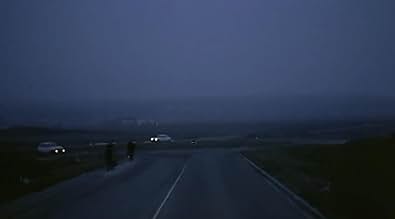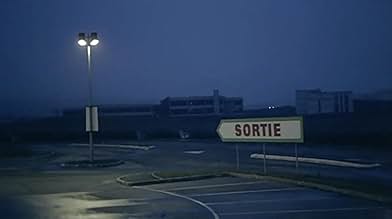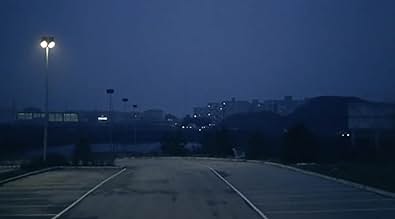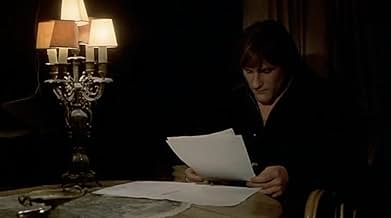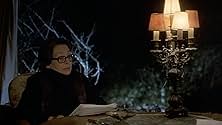Füge eine Handlung in deiner Sprache hinzuA female writer reads a script to her future performer. A script still in the making, as little by little the images come to life and the characters take shape.A female writer reads a script to her future performer. A script still in the making, as little by little the images come to life and the characters take shape.A female writer reads a script to her future performer. A script still in the making, as little by little the images come to life and the characters take shape.
- Regie
- Drehbuch
- Hauptbesetzung
- Auszeichnungen
- 1 Nominierung insgesamt
Empfohlene Bewertungen
Intellectually explosive material here from Duras, which got her booed at Cannes. Highly feminist without providing any signposting as such. I guess a point is that a lorry driver and a millionaire, are both men, and this similarity brings them closer together than a man and a woman. Both a communist and a capitalist fixate on the material. Karl Marx and Adam Smith are both men. Marguerite Duras hopes you are very angry reading this.
OK, so what set of images and sounds do we have here? We have two types of scenes, either scenes of a blue lorry amongst industrial sprawl, or Marguerite Duras herself and Gerard Depardieu talking through a script about a hitch-hiker and a lorry driver. Duras' modus operandi with many of her films is to get you to see the real images of the film in your head, with the actual images on the screen merely your facilitator. You are to complete the story (as when you read a book). As it is, even this is difficult as the physical progress of the story is monotonous, however we are free to luxuriate and terrify ourselves in the simple yet sublime task of imagining the ocean, for example.
Collusion between classes is hinted at, a pact to mutilate our true selves. Dismayed talk about children being trained to be less personal foreshadows a later work, Les Enfants.
The images from Bruno Nyutten are almost paradoxically beautiful, how can the devastated countryside soothe the eyes so much? Rows of spindly leafless trees benefit from the accompanying Diabelli variations, and magic hour filming works its magic.
Pauline Kael famously spent two paragraphs dismissing Star Wars and seven paragraphs analysing Le camion, all within the same article around the time both were released (there also followed seven paragraphs on the prison film Short Eyes). Marguerite reveals herself in the film as quite the bright-eyed wampyr, disdainful of the patriarchy. Certainly she deserves triple and then some the attention of Star Wars.
This film is a punishment for being your conditioned self, or a billet-doux. Choose.
OK, so what set of images and sounds do we have here? We have two types of scenes, either scenes of a blue lorry amongst industrial sprawl, or Marguerite Duras herself and Gerard Depardieu talking through a script about a hitch-hiker and a lorry driver. Duras' modus operandi with many of her films is to get you to see the real images of the film in your head, with the actual images on the screen merely your facilitator. You are to complete the story (as when you read a book). As it is, even this is difficult as the physical progress of the story is monotonous, however we are free to luxuriate and terrify ourselves in the simple yet sublime task of imagining the ocean, for example.
Collusion between classes is hinted at, a pact to mutilate our true selves. Dismayed talk about children being trained to be less personal foreshadows a later work, Les Enfants.
The images from Bruno Nyutten are almost paradoxically beautiful, how can the devastated countryside soothe the eyes so much? Rows of spindly leafless trees benefit from the accompanying Diabelli variations, and magic hour filming works its magic.
Pauline Kael famously spent two paragraphs dismissing Star Wars and seven paragraphs analysing Le camion, all within the same article around the time both were released (there also followed seven paragraphs on the prison film Short Eyes). Marguerite reveals herself in the film as quite the bright-eyed wampyr, disdainful of the patriarchy. Certainly she deserves triple and then some the attention of Star Wars.
This film is a punishment for being your conditioned self, or a billet-doux. Choose.
Lucky to see this movie at a Duras Film Festival in Chicago many years ago. Duras and Gérard Depardieu read a script while we watch a truck make its rounds with Diabelli Variations in background.. Can't explain why it works but it does. I read an essay about this movie and it spoke to an "autism" in its style. Not sure the story matters but it is about a lone Jewish Hitch hiker who is picked up by the truck driver. I also believe it recounts Duras's involvement in the French Communist Party. I don't understand why movies directed by Duras are not on DVD. Must be something she wrote in her will. Who owns these movies? I especially would like to see "Moderato Cantabille" on DVD.
I know Marguerite Duras is famous, but The Lorry is one of the most boring movies I've ever sat through. I wonder if even her biggest fans enjoyed this one. Perhaps they did, since they got to pretend they were hanging out in her living room while she spitballed her next story idea.
When I tell you that nothing happens in this movie, it's actually true. For eighty minutes, Marguerite sits at a table in her home and talks about a movie she's going to make. Sometimes she reads aloud passages from the script and sometimes she just talks about her vision for what would happen. Sometimes the film cuts to exterior shots of the open road, since her would-be movie is about a hitchhiker in a truck. Sometimes there are long silences. Sometimes her one-person audience, Gérard Depardieu, asks a question. Sometimes he just sits there and turns the page of the script. If you have insomnia and sleeping pills don't work, put this movie on for ten minutes. It worked for me several times.
When I tell you that nothing happens in this movie, it's actually true. For eighty minutes, Marguerite sits at a table in her home and talks about a movie she's going to make. Sometimes she reads aloud passages from the script and sometimes she just talks about her vision for what would happen. Sometimes the film cuts to exterior shots of the open road, since her would-be movie is about a hitchhiker in a truck. Sometimes there are long silences. Sometimes her one-person audience, Gérard Depardieu, asks a question. Sometimes he just sits there and turns the page of the script. If you have insomnia and sleeping pills don't work, put this movie on for ten minutes. It worked for me several times.
Marguerite Duras said, "I approach cinema with the intention to murder it." "Le Camion" is irrefutable evidence of her criminal intent. John Waters called "Le Camion" an example of truly experimental cinema because it is the absolute antithesis of anything remotely commercial. Released the same year as "Saturday Night Fever," it would be a sign of insanity to consider pairing "Le Camion" with it on a double-bill. Duras' film consists of endless shots of a blue truck driving through industrial sectors of the French suburbs, edited with the jaded-looking, chain-smoking director commenting on a script (that is never actually shot) to actor Gerard Depardieu. There is plenty of time to contemplate Duras' bracelets, wristwatch and her home decor, as well as what you might do once you're finally let out of the theater. An interior shot of the truck's upholstered bucket seats actually stuns the audience as if it were a moment of high-intensity drama. Eighty minutes long, the film actually seems much longer; in fact, it seems to take days. Oddly, it held me in a trance-like state for its duration. For his part, Depardieu -- constantly upstaged by the passive-aggressive Ms Duras -- looks bemused and feeds his co-star a lot of questions, which she answers with dismissive grandiosity, all of which is aimless. She talks about the script -- a story of a male truck-driver and an older, female hitchhiker, and their conversations, which are political, humanitarian, philosophical and all complete twaddle -- as if she has all the time in the world, and so do you. There may be something existential intended or it may, as I suspect, all be drivel. In any event, there is no question MD succeeds in strangling the life out of the cinema -- very slowly. Not to be missed, and unlikely you will want to see it twice. As Waters pointed out, introducing the film at Alliance Francaise in New York in February 2006, this film was never released on VHS and is unlikely to show up anytime soon on DVD.
Marguerite Duras is having a conversation with Gerard Depardieu about a film she intends to shoot, whose script she is holding in her hands. That movie is Le camion. This relaxed conversation alternates with long shots of landscape images shot from the truck window, taking advantage of Beethoven's Diabelli variations to give the viewer something to enjoy.
Marguerite pretends to know what she's talking about and looks up as if telling Gerard what she's thinking, but obviously it's not that at all, because mid-sentence she has to glance at the page she's holding, or shamelessly start reading. Of course, she says each sentence delighting in her creativity as if she were devising the Tractatus Logico-Philosophicus.
The script she is reading is ridiculous, uninteresting, a delirious conversation between a trucker and a hitchhiker woman about the origin and end of the world, about the universe, about the proletariat; but Gerard Depardie is forced to say again and again I see, and put on a face of understanding or athat of someone experiencing an epiphany with each enigmatic outburst from Duras.
The film seems conceived, written and made in a couple of hours. That is not serious because obviously it has cost nothing: neither money nor effort. I guess Gerard Depardieu would participate for free, because he has nothing to do either, not even learn a script, since like Duras, he reads directly from some pages in front of him. I suppose that in those years he would find it a prestigious project.
Pulling on its literary prestige, she always had great names in French cinema acting in her sometimes unbearable films, and it is always interesting to see Jeanne Moreau or Delphine Seyring, even if they do nothing more than wander in front of the camera. When she wants to give her films more packaging, she also hires cinemagraphers like Sacha Vierny.
In Cannes Le camion was a scandal, and Duras seems to have had to endure insults. Terrible, this woman did no harm to anyone filming Le camion: I don't think she needed subsidies to make this film, I don't think anyone was fooled by promoting it as an action film...anyone who entered the cinema could expect what they would find.
We also have to thank her for never shooting that script she had planned: a shooting that, as she herself says, would be fast, cheap, in black and white. To make it clear that none of the images would correspond to that unshot film, what we see is in color.
Definitely not among Duras best.
Marguerite pretends to know what she's talking about and looks up as if telling Gerard what she's thinking, but obviously it's not that at all, because mid-sentence she has to glance at the page she's holding, or shamelessly start reading. Of course, she says each sentence delighting in her creativity as if she were devising the Tractatus Logico-Philosophicus.
The script she is reading is ridiculous, uninteresting, a delirious conversation between a trucker and a hitchhiker woman about the origin and end of the world, about the universe, about the proletariat; but Gerard Depardie is forced to say again and again I see, and put on a face of understanding or athat of someone experiencing an epiphany with each enigmatic outburst from Duras.
The film seems conceived, written and made in a couple of hours. That is not serious because obviously it has cost nothing: neither money nor effort. I guess Gerard Depardieu would participate for free, because he has nothing to do either, not even learn a script, since like Duras, he reads directly from some pages in front of him. I suppose that in those years he would find it a prestigious project.
Pulling on its literary prestige, she always had great names in French cinema acting in her sometimes unbearable films, and it is always interesting to see Jeanne Moreau or Delphine Seyring, even if they do nothing more than wander in front of the camera. When she wants to give her films more packaging, she also hires cinemagraphers like Sacha Vierny.
In Cannes Le camion was a scandal, and Duras seems to have had to endure insults. Terrible, this woman did no harm to anyone filming Le camion: I don't think she needed subsidies to make this film, I don't think anyone was fooled by promoting it as an action film...anyone who entered the cinema could expect what they would find.
We also have to thank her for never shooting that script she had planned: a shooting that, as she herself says, would be fast, cheap, in black and white. To make it clear that none of the images would correspond to that unshot film, what we see is in color.
Definitely not among Duras best.
Wusstest du schon
- WissenswertesMarguerite Duras's debut as an actress and she also wrote and directed this film.
- VerbindungenEdited into Passage des arts: Marguerite Duras, l'écriture et la vie (2021)
- Soundtracks33 Veränderungen über einen Walzer von A. Diabelli op 120
Written by Ludwig van Beethoven
Top-Auswahl
Melde dich zum Bewerten an und greife auf die Watchlist für personalisierte Empfehlungen zu.
Details
- Laufzeit
- 1 Std. 16 Min.(76 min)
- Sound-Mix
- Seitenverhältnis
- 1.66 : 1
Zu dieser Seite beitragen
Bearbeitung vorschlagen oder fehlenden Inhalt hinzufügen

